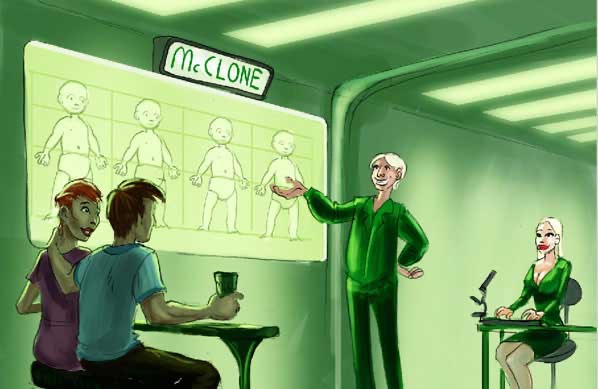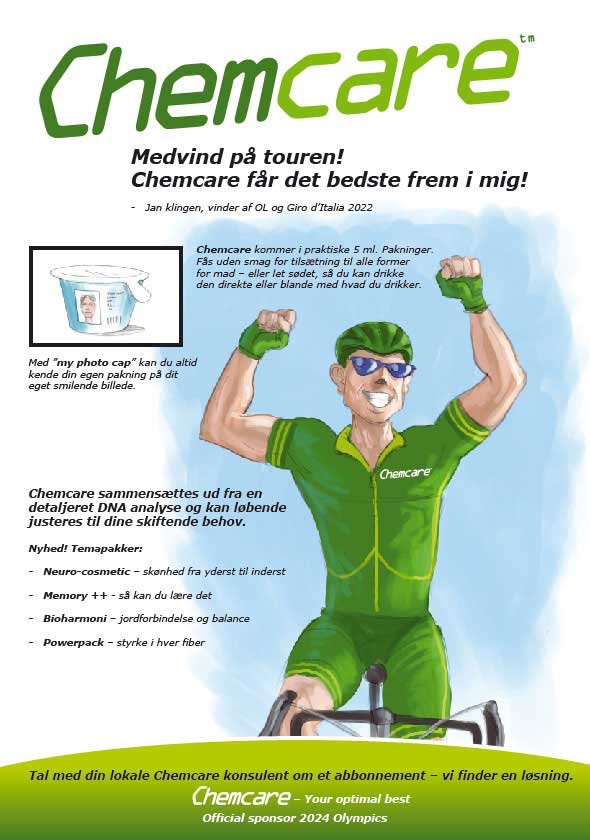
Six months ago, when Lars Andersen got into his truck to embark upon the last leg of his journey back home to Denmark from Hungary, he had no idea that this trip would make him the center of a protracted and loud moral discussion - not only in Denmark, but throughout the European community.
At 3:40am, just after Hamburg, another truck suddenly changed lanes right in front of him, and Lars Andersen crashed into its trailer. Both trucks got out of control and wound up totally damaged at the side of the highway.
Police investigations following immediately after the accident surprisingly revealed that Lars Andersen had taken no drugs whatsoever - and that would eventually become the subject of the controversy.
His insurance company refused to pay damages arguing that it was completely irresponsible on the part of Lars Andersen to drive long distances without taking any kind of stimulant or something that would sharpen his concentration.
In the lawsuit that followed, the court decided in favor of the insurance company. During the trial, the prosecutor had emphasized that in today's society the general public has a right to be certain that people holding jobs with special responsibilities are medically attuned to performing at their very best - a principle that has long since been established for doctors, nurses and pilots, just to mention a few. The judge stated in his grounds for the judgment that the benefits of medical optimization were obvious and that the use of such medication by truck drivers had in fact become a professional standard. Hence, by not following the standard, Lars Andersen had acted irresponsibly.
As a matter of principle, the case was immediately appealed. Since the decision may potentially impact the interpretation of laws across the EU, the case has attracted considerable attention from interest organizations, citizens' groups and political debaters throughout Europe.
It is an old and fundamental issue that has been pushed to the extreme. At its core, it is a matter of who we want to be as human beings.
Do We Have The Right To Be Unhappy?
Medical optimization - or Med-Op for short - comprises a wide array of treatments that have changed the health and performance of most people dramatically.
Roughly speaking, today nobody needs suffer from obesity, baldness, impotence, acne or other flaws that used to cause considerable concern with a lot of people. Children flipping through the family's photo album looking at the paper photos can have a good laugh studying the bald heads of their grand fathers and all the other men with very little hair left.
The changes are not only on the outside, however. Med-Op increasingly includes temperamental, mood-, endurance- and thought-related adjustments. The composition of medical optimizers differs significantly from one person to the other - partly because our genes and health conditions differ, partly because we want to enhance different elements of our personality. Last but not least, price is an important issue as well - as we shall return to.
“We no longer live in the stone ages”, says Flemming Macht, professor at the Danish National Hospital's neuro-cosmetics department, “We are making great progress in our understanding of the human body and mentality, and our ability to improve our general well-being and performance at almost all levels is developing rapidly. Why not use that knowledge to make us happier, wiser, richer and healthier - just like we use all other kinds of technologies to improve our prospects?”
Opinion polls reveal that even if consumer responses to medication have become considerably more favorable during the past 5-6 years, a large part of the general public is still utterly against. Those opposing medical optimization have united through the international grass-roots movement “The Savages”. Its members believe that the original human nature should be preserved - both because they feel that this is the life that suits us the best, and because they fear the negative consequences of changing the very nature of humanity. The name, “The Savages”, refers to an almost 100 hundred year-old book, Aldous Huxley's “Brave New World”, which describes a society where sadness and flaws were kept abreast by means of a miraculous remedy called “soma”. In the book, “the savage” refuses to take soma - much to the astonishment of Dr. Mustapha Mond, the representative of the authorities, who unsympathetically declares: "In fact, you're claiming the right to be unhappy."
To which the Savage defiantly replies: "All right, then, I'm claiming the right to be unhappy."
And that is the very claim: the right to NOT take medication that the lawsuit against Lars Andersen will put on trial.
The Optimal Child
Signe Aug was optimized even before she was born. She was conceived using artificial insemination and on that occasion, her parents chose to have a dozen of Signe's mother's eggs fertilized. The doctors allowed the eggs to divide for a couple of days until they could take out one cell from each of the embryos and carefully analyze the genes. Signe's parents then had an elaborate presentation explaining what kind of person each of the fertilized eggs might grow into. Helped by a genetic advisor, they chose the embryo that seemed to be the most promising and best match to their hopes for the planned baby. The egg was then inserted into Signe's mother's womb where it developed as expected without any complications during the following nine months.
It is fair to say that both Signe's parents and her doctors knew her quite well before she was born, and therefore, during her pregnancy, Signe's mother could make sure that she ate the food and took the supplements that would ideally suit the needs that Signe's genes had indicated she would have. When Signe had been born and she and her parents returned to their home from the hospital, they brought with them the first box of med-op capsules to mix into her milk.
Since then, not a day has passed when Signe has not taken her dose of med-op - but obviously the composition of the drug has changed over time to match her developmental stage; through children's diseases, her first days at school and presently puberty, exams and her first heart aches.
When he was younger, Jonas, Signe's father, was a swimmer and a member of the Danish national team. He never made a secret of the fact that he would use all legal means to improve his performance. Today, he has the privilege of hindsight - the world has seen a significant shift in the attitude towards optimization.
“Unfortunately, it happened only around the same time that I retired as a elite swimmer, never the less it was a relief to see the end of the totally outdated rules against doping. They were a joke, really, and it was amazing to see how much the general opinion had changed at the 2020 Olympics. By then, we could start making good use of our knowledge to discover just how much a human being can accomplish. Some claim that optimization is not healthy … I absolutely cannot agree to that. It goes without saying that an athlete must necessarily be in perfect health to achieve such results.”
In conclusion, Jonas Aug states that the new reality in the world of sports was most clearly demonstrated at the 2024 Olympics, when three of the eight main sponsors were pharmaceutical companies.
The New Normal
While it was totally unacceptable for athletes to use optimization for a long time, the military had no such qualms and ventured fairly freely into various experiments. The majority of the drugs, we now take to sharpen our ability to focus, reduce our need for sleep and subdue any nervousness were originally developed for military purposes. The prospect of soldiers who think faster, are stronger, have more stamina and who do not get mental problems from their battle experiences released very generous development budgets for medical optimization.
At the start of the millennium, drugs had been identified that would allow the user to stay awake for 40 hours without any major drops in performance after which the user would need nothing but a good night's sleep to be back to normal.
In their development portfolio, scientists had several promising drugs that would significantly improve the ability to learn and memorize. Rapid progress was also made within the field of tranquilizers to adjust moods and temper - and the drugs eventually became even more effective as our understanding of the genes made it possible to regulate the treatment to perfectly match the individual's DNA profile - which also contributed to drastically reducing the side-effects.
Like in the world of sports, medical optimization of the human psyche was considered problematic for many years - it was almost considered a form of cheating. Despite the fact that large parts of the population go through depressions and other mental problems some time during their lives, “sunshine drugs” had a very different ring to it as compared with drugs prescribed for physical disorders like diabetes or cardiac problems.
Like with sports, it gradually became impossible to uphold doping controls at exams or to legislate against medication activities at schools and workplaces. The old rules and the authorities' views on optimization gradually became obsolete as compared with the realities of the world at large.
If you have a drug with a demonstrated ability to facilitate learning or improve your memory by 25%, that drug will obviously become a household remedy - even if it may only have been approved for use by people suffering from invalidating concentration lapses or whose memory has started failing them.
Any treatment that halts old age or even invigorates the body has always been a veritable gold mine to the medical industry. When old age starts to make itself felt, most people are willing to pay whatever they can to buy themselves more time on this planet. Therapeutic cloning, stem cells and telomere therapy have proved themselves effective treatments, but continue to be extremely expensive.
In addition to her standard medication, Maria Meyers has had her nerve cells replaced and most recently her entire immune system in connection with vacations in Thailand and Vietnam. Despite her 91 years of age, she still works 30 hours a week as an on-line counselor.
She does not feel that she is getting old:
“When I was young, old people seemed to gradually lose track of things, but to me it is the other way round, I think. I feel, I am getting increasingly good at handling my life - and learning new things all the time.”
It is very telling, when - on his latest album called “Loving you for ever”, Danish Steffen Brandt sings:
My love,
The road we travel, you and I,
Gets longer and longer
The longer we travel.
There Are Side-effects, Of Course
Medical optimization is perfectly suited for a time and place where more and more elderly need to stay on the labor market. Simultaneously, globalization puts a constant pressure on the best developed economies to focus on the creative and developing industries, and in those jobs, performance is hard to uphold without that little extra to keep the brain alert and open to change.
Consequently, we typically see treatments, which were originally developed to relieve serious illnesses, being used by perfectly healthy people, who want to enhance their general performance. And, as has been the case with numerous key technologies, people - eventually - can no longer function normally in today's society WITHOUT the treatment - as the case of the long-distance driver, Lars Andersen, clearly shows.
The overall problem, of course, is that the headstart you get from the optimization is gradually reduced as everybody else start using the same medication. The Ministry of Education and Research foresaw this as early as in 2018. In a report on optimization, the ministry described it as an arms race:
“Medical optimization may give the individual student an immediate advantage, but it forces the parents of the remaining students to also medicate their children in order for them to keep up. The result may well be an overall improvement of the class' performance, but more widely differentiated. Some students will be very aggressively optimized towards specific subjects. Students, who do not wish to engage in medical optimization or lack the financial resources, may well drop significantly behind the rest of the class.
Not all parents can afford the systematic approach taken by Signe Aug's parents, but the issue has far wider consequences.
Med-op is a costly process, especially if you want to analyze and follow-up on an ongoing basis in order to make the medication match the never-ending process of change exactly. To many families, med-op subscriptions take up as much space on the budget as, for instance, food or transportation.
As has been the case with so many other technologies, this leads to polarization in society - when those who can afford it can buy the tools necessary to give them an even bigger advantage in the quest for money, jobs and power. And vice versa, those who cannot afford it get left even further behind in the competition.
Even if you can afford it, medical optimization is not an unqualified blessing, though.
In connection with the Lars Andersen lawsuit, The Savages have claimed that the side-effects of med-op are being systematically concealed: The medical industry has grown so large and powerful that no one dare raise their voice against them. But the fact is that tens of thousands of people have severe mental disorders because of med-op.
Among other things, The Savages' spokesman points out that optimization may give you a better memory, but at the same time, people typically get more sensitive to pain and less capable of handling grief and hardships. He also claims that it is a matter of common knowledge that stimulants and focusing drugs trigger aggressive or even violent behavior in many of their users.
George Native, one of the mainstays behind The Savages' declaration of principles believes that fundamental medical optimization is a misunderstanding: “Optimization will not make us better human beings. Not knowing sadness or pain does not make us any happier. On the contrary, overcoming resistance, crises and pain brings forth our true human qualities, makes us feel that we are alive.”
George Native feels that we should define what we really want from life: “What do we really get from being so intensely focused and doped that we can work harder and faster than nature ever intended us to do? We are fighting each other into the depths of a competitive hell - is that progress?”
Homo Sapiens 2.0
Everything seems to indicate that going forward, medical optimization will be supplemented with permanent genetic procedures.
The logic is tempting: It is far more convenient. Rather than swallowing a number of capsules every day, you simply have genes implanted that will cause the cells in your body to automatically produce the relevant drugs. The treatment is similar to a vaccination; you get a shot of various types of viruses that are capable of finding the right cells in your body to invade and where they will implant the optimized genes.
In most cases, one or two treatments will suffice for an entire lifetime, but one may of course decide to expand the treatment with other viruses to get new skills and capabilities as the need arises or new medical optimization options emerge.
The ultimate is when parents decide to strengthen certain characteristics or talents in their children already at the early embryonic stage by having optimized genes inserted in the fertilized egg. This will affect all the child's cells so the new genes will eventually be transmitted to the next generation once the optimized child has children of his or her own.
Ben Ying, geneticist at Optimalpraxis AG in Leipzig believes that within a few generations, we will see the human race specialize in ways we cannot even begin to imagine. Just like farmers have bread highly productive livestock, families will emerge whose members are literally born and raised for sports, music or mathematical thinking.
Or, as The Savages claim: Humanity will be divided into two races, the inferior and the superior, who will develop in opposite directions at a rapidly increasing speed.
Text: Peter Hesseldahl